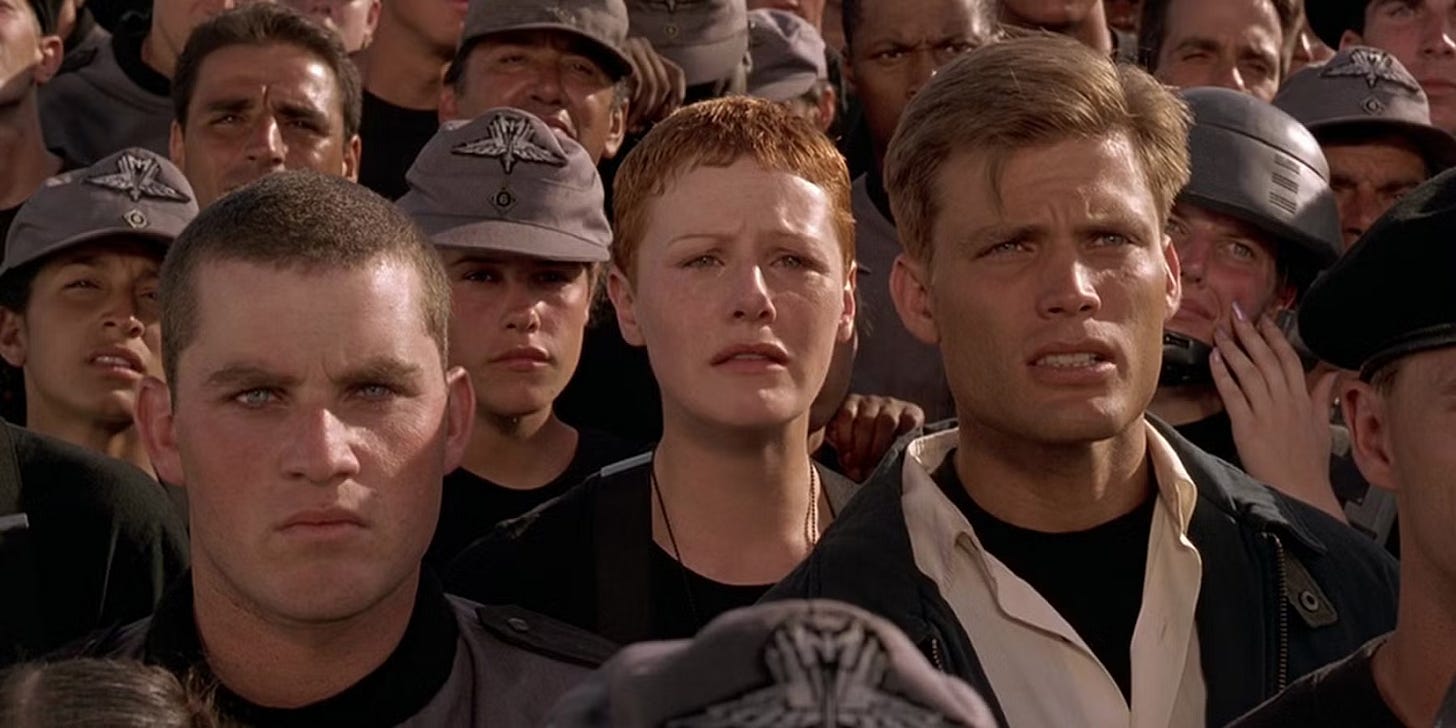I watched Starship Troopers through a window. I was nine years old, my brother was fifteen. My mother said he was old enough to watch it with friends, despite being three years shy of its eighteen plus rating. I wasn’t so lucky.
Banished from the room, I feigned playing outside to steal a look at the forbidden bit of home cinema. I pressed my face against the glass, but couldn’t make out what was going on. Something about high school kids fighting alien bugs.
I was older when I watched it again. And again, and again. As I grew up the things I originally liked—the camaraderie, sacrifice, explosions—were swallowed whole by a deeper reading. It’s obviously a send-up of fascism! Beauty isn’t proof of anything. War is hell. People might be stupid, but systems can be too.
All the rest is furniture, isn’t it?
Starship Troopers is one of those films that has taken on a life of its own, a cultural artefact around which a type of particularly online person calibrates their worldview. Paul Verhoeven’s flick is in that way much the same as AI: a container into which we pour our own beliefs and biases.
On Bluesky AI is just statistics, maths or linear algebra on steroids. It’s a tool, dummy. On X it’s lightning in a bottle, a limitless stream of emoji-ridden breakthroughs that will change everything.
That was the case long before the Balkanisation of social media. Claims to universalism are, after all, part and parcel of a project that seeks to distill the essence of cognition. When you’re holding out for sparks of intelligence, you shouldn’t be surprised when everything catches fire.
For some, the AI story is one of human ingenuity, scientific progress, and the realisation of potential. It’s a milestone on the Kardashev scale. One might acknowledge the risks, but is likely to believe that the direction of travel is a good thing.
Others read the same developments as a tale of hubris, surveillance, and the concentration of power. They see the progress narrative as at best naïve and at worst misleading. The entire AI project is a paper tiger. And hey, even if it does work, it's still an exercise in exploitation.
Would you like to know more?
The Starship Troopers film is based on a novel written by Robert Heinlein in 1959. It’s about some kids who join the army of the far-ish future to brutalise rebels and squash giant bugs under the heels of their immaculate powersuits. The countries of earth are part of some global superstate, but only a lucky few of the planet’s inhabitants get to vote.
It's a weird, unseemly place with some funny ideas about civil life. People only get to participate in politics if they join the ‘Federal Service’, which is sort of like a two-year term of indentured servitude to the government. Imagine a secondment to a Whitehall quango or a tour of duty in the armed forces, with a chance that you may never leave.
But on Heinlein’s earth, no one wants to take the deal and become a citizen. With the exception of kids who see joining up as a transgressive act of teenage rebellion, people in the story are generally happy to live out their days as disenfranchised members of society.
Critics like to call the world of Starship Troopers fascist. But while Heinlein’s book describes an undesirable polity, I don’t know if it’s a clearly fascist one. There’s free speech. Enrolment in the military is discouraged. You can even drop out after you’ve sworn the oath of loyalty.
When our protagonist—Buenos Aires high school graduate Johnny Rico—joins the service, the attending staff tell him there are no good jobs. He certainly shouldn’t expect to work in the army because they already have too many recruits.
They take a physical exam which turns out to be theatre. Everyone passes, no matter how well they do. The doctor says that military service gets you a ‘purely nominal political privilege’ that isn’t even worth the cost of joining up.
Johnny’s wealthy father calls Federal Service ‘a decidedly expensive way for inferior people who would otherwise be unemployed to live at a public expense’. That doesn’t exactly sound like joining the heady ranks of the political elite.
Then again, after the death of Johnny’s mother, Rico senior joins the army to prove he is ‘not just a product-consuming economic animal, but a man’. It might not be precisely fascist, but it’s certainly got a thing for militarism.
Offenders are flogged in public, death penalties are easy to come by, and experienced soldiers execute their juniors for honest mistakes. But with democracy and some of the trimmings, it's more like Ancient Rome than Nazi Germany.
The book is a vehicle for Heinlein’s views about human nature. As one of the characters explains: ‘man has no moral instinct, [it must be acquired through] training, experience, and hard sweat.’ People are products of the social order, not producers of it.
Paul Verhoeven thought otherwise. As the Dutch director of the 1997 adaptation told Empire magazine:
“And with the movie, we tried, and I think at least partially succeeded, in commenting on that [the book’s politics] at the same time. It would be ‘Eat your cake and have it.’ All the way through we were fighting with the fascism, the ultra-militarism. All the way through I wanted the audience to be asking, ‘Are these people crazy?’”
The phrase ‘partially succeeded’ is the important bit. Starship Troopers only works as a parody of Heinlein’s book because it deliberately sustains two meanings. If it wasn’t a story about comrades displaying courage in the face of overwhelming odds, it couldn’t be an effective critique of military adventurism. Even at the limit, it could only ever be a partial success.
Every now and then some new discourse creeps onto my timeline about the film. On one side you have media literacy types who say there is no other way to read the text other than as satire. On the other you have people who say they like it as an all-American war film about honour and duty. They say something like ‘yeah, I know it’s not what Verhoeven intended, but I don’t care.’
An instinctive reading is that the former is right and the latter is wrong. But not so fast. The problem is that the film is only a good skewering of a martial life because it takes its subject seriously. So while it might feel good to say that your political opponent doesn’t understand the text, your ability to say that is wholly dependent on the possibility of getting the wrong end of the stick.
Verhoevenian technology
Verhoevenianism isn’t just about irony, contradiction or dialectical thinking. It’s about deliberately sustaining incompatible interpretations, where meaning itself is a byproduct of the tension between these readings.
It’s when systems become their own best parodies, when the most potent critiques of them emerge through normal operations, and when the aesthetic distance between critique and celebration goes to zero.
In this sense, AI is a quintessentially Verhoevenian technology. When people look at exactly the same output and see either future master of the universe or bullshit generator, it’s hard to argue that both interpretations don’t contain a germ of truth.
Some see behaviour that validates views of mind, others spy sophisticated pattern recognition with no meaningful understanding. One type of person reckons with dangerous capabilities just around the corner, another spots a battering ram for knocking down the pearly gates.
The same models are creative tools that democratise access to art, insensible machines for appropriating human creativity, vehicles for seductive new modes of consumption, and shallow imitations of genuine expression.
In the cultural imagination, AI is both controllable and uncontrollable, anthropic and alien, democratising and centralising. Experts sharply disagree about the future of the AI project.
First hand experience confirms these beliefs. Language models are simulators; they take on the persona they are asked to by creator and user both. They are mirrors that are sensitive to input patterns, conform to built-in biases, and generate outputs that can be interpreted through your favourite frame of reference.
Developers are the architects of the Verhoevenian moment. Labs pitch the technology as both revolutionary and incremental, dangerous enough to require careful stewardship yet safe enough for widespread deployment.
But that’s not to say they have anything like control. AI is Verhoevenian precisely because it succeeds so readily in taking on a life of its own. If the author isn’t dead, then they certainly have one foot in the grave.
Just ask Robert Heinlein. In chapter six of the book, he opens the action with a quote from Thomas Paine: ‘What we obtain too cheap we esteem too lightly…it would be strange indeed if so celestial an article as freedom should not be highly rated.’
It reminds us that meaning flows from context. Who could argue that the essence of AI changes based on your point of view, that it costs nothing for some and much for others?
It’s whatever you want it to be, like a film I saw through a window once.




wonderful essay again, thank you
reminds me of - "I don’t believe in magic. But I believe in people believing in magic"